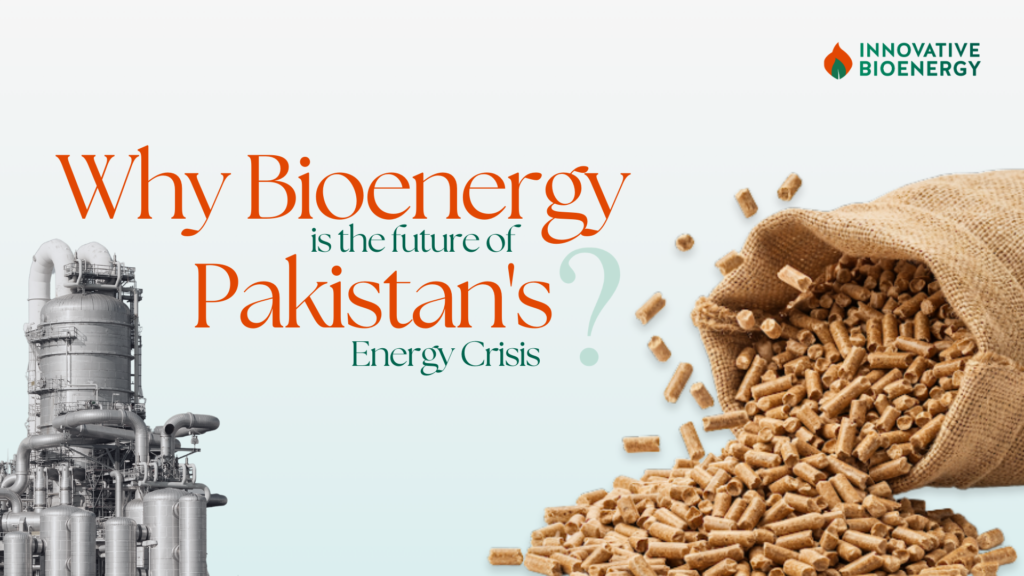For many years, Pakistan has faced a severe energy crisis. The country has depended mostly on fossil fuels like oil, gas, and coal. However, these resources are becoming more expensive and scarce. Power shortages and load shedding have become common, affecting businesses, industries, and daily life.
Many people in rural areas still rely on wood and kerosene for their energy needs, which is harmful to both health and the environment. This situation has forced Pakistan to explore alternative energy sources.
To find a lasting solution, Pakistan must look towards renewable energy sources, and bioenergy offers a promising way forward.
What is Bioenergy?
Bioenergy is a type of renewable energy made from organic materials such as:
- Agricultural waste (crop residues, wheat husks, sugarcane bagasse)
- Animal manure (used in biogas production)
- Municipal solid waste (household and industrial waste converted into fuel)
- Forestry residues (wood chips, sawdust, and plant matter)
Instead of depending on costly and polluting fossil fuels, Pakistan can use bioenergy to produce electricity, heat, and fuel more cleanly and sustainably.
Why Bioenergy is Important for Pakistan
1. Abundant Biomass Resources
Pakistan has vast natural resources that can be used to produce bioenergy, offering a practical and eco-friendly solution to the country’s energy crisis. Every year, millions of tons of agricultural waste go unused, often burned in fields, causing air pollution and smog. Instead of letting this waste harm the environment, it can be transformed into valuable energy. Biomass power plants can convert crop residues into electricity, while animal manure can be processed into biogas as a cleaner fuel source. Additionally, municipal solid waste can be repurposed to generate energy, reducing landfill waste and contributing to a more sustainable future. Collectively, all these resources generate 230 billion tons of biomass every year. By using these resources efficiently, Pakistan can create a stable and greener energy supply.
2. Energy Security & Environmental Benefits
Pakistan depends heavily on imported fuel, which makes energy prices unstable and increases economic pressure. Bioenergy offers a reliable, locally sourced alternative that can reduce this dependency. By using bioenergy, the country can stabilize energy costs, lower greenhouse gas emissions, and improve air quality. Unlike fossil fuels, bioenergy is renewable and can be used for years without running out. Many countries have already adopted bioenergy as a cleaner and more sustainable option, and Pakistan has the opportunity to do the same for a better energy future.
3. Economic Benefits: Cost Savings & Job Creation
Using bioenergy can help Pakistan save money by reducing the need to buy expensive fuel from other countries. Many industries that rely on costly diesel generators can switch to biomass energy and lower their costs. This change can also create thousands of jobs in farming, waste collection, biogas plant operations, and technology. It will boost the economy and provide more work opportunities, especially in rural areas where jobs are limited.
4. Technological Advancements & Infrastructure Development
Pakistan has already started investing in bioenergy projects to address its energy challenges such as:
- Sanawan Biomass Power Plant – A key project demonstrating the potential of biomass energy for electricity generation.
- Biogas digesters for farmers – Helping reduce dependence on traditional fuels.
- Factories switching to biomass fuel – Many industries now use wood pellets instead of coal.
If Pakistan continues to develop its bioenergy sector, it can help reduce power shortages and improve energy availability across the country.
How Germany Reduced Energy Crisis with Bioenergy
Germany is one of the top countries using renewable energy, and bioenergy is helping it move away from fossil fuels.
Germany’s Strategies:
- Investment in biogas plants & waste-to-energy projects.
- Large-scale biomass power stations to replace coal.
- Government incentives to encourage businesses and industries to adopt bioenergy.
Pakistan can learn from the success of other countries working on this alternate source of energy by building waste-to-energy plants in major cities, supporting farmers and industries in adopting bioenergy solutions, and creating policies that attract private investment. By following these steps, Pakistan can lower energy costs, improve energy security, and move towards a more sustainable future.
Government Initiatives & Policy Support
The Pakistani government has begun to recognize the potential of bioenergy due to energy crisis, with organizations like the Pakistan Council of Renewable Energy Technologies (PCRET) promoting biogas and biomass energy. International support from countries like the Netherlands and China has also helped in developing bioenergy projects.
However, more action is needed to fully harness its potential. Providing financial incentives such as grants and tax reductions can encourage industries to switch to bioenergy. Public awareness campaigns can help people understand its benefits, while stronger policies can attract businesses and investors to expand bioenergy projects. With the right steps, bioenergy can become a major part of Pakistan’s energy future.
Conclusion
Pakistan is making significant strides in the bioenergy sector, implementing innovative projects such as biogas digesters tailored for local farmers, which help convert agricultural waste into clean energy.
The Sanawan Biomass Power Plant stands as a notable example of progress, generating electricity from organic materials and contributing to the region’s energy supply. Additionally, various industries are transitioning to biomass fuel, which is derived from renewable resources, thereby reducing their dependence on traditional fossil fuels.
To achieve this, there is a critical need for stronger government policies that foster investment in this sector, as well as initiatives to raise public awareness about the benefits of bioenergy.
By prioritizing these areas, the country can unlock the economic potential of bioenergy, which is projected to stimulate job creation, drive sustainable growth, and offer a stable, environmentally friendly energy source. The opportunity to scale up these efforts is now—orchestrating a shift toward a sustainable energy future is both timely and essential for Pakistan.



